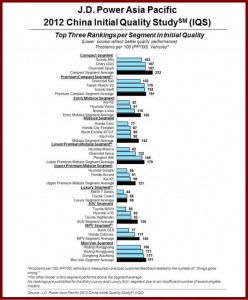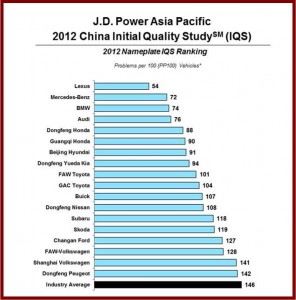Chinese automakers made large improvements in initial quality during 2012, narrowing the gap between domestic and international brands. As a result, the auto industry in the world’s largest market – 20 million vehicles annually – set a record low in average problems per vehicle.
Overall, initial quality across the industry averaged 146 problems per 100 in 2012, which is the lowest number of problems since the inception of the study in 2000. Initial quality has improved by an average of 16 pp100 from 2011, largely caused by improvements among Korean and Chinese domestic brands that were far from producing good vehicles by global standards.

The Chinese government might be in a territorial dispute with Japan, but in China, Japanese automakers clearly own a large part of the top quality ratings.
Excessive fuel consumption remained the most frequently reported problem as is has since 2007. However, engine power loss with air conditioning use was tied as the most frequently reported problems in 2012. New-vehicle owners in China are also apparently sensitive to noise problems, with brake noise, wind noise, engine noise and fan/blower noise accounting for four of the top 10 most commonly reported problems.
Initial quality of Chinese domestic brands improved to 212 pp100 in 2012 from 232 pp100 in 2011, narrowing the gap with international brands to a still significant 95 pp100. Initial quality of international brands also improved year over year, to 117 pp100 in 2012 from 131 pp100 2011. The data comes from the J.D. Power Asia Pacific 2012 China Initial Quality Study or IQS just released.
“Despite this historic milestone for Chinese brands as a whole, no domestic nameplate exceeds the industry average in initial quality. This signals significant room for continued future improvement,” Dr. Mei Songlin, vice president J.D. Power China Operations, who of course is not without self-interest here.
The China study, now in its 13th year, examines problems experienced by new-vehicle owners within the first two to six months of ownership. The study looks at problems experienced by owners in two categories: design-related problems, and defects and malfunctions. The overall initial quality score is determined by problems reported per 100 vehicles (pp100), with a lower rate of problem incidence thereby indicating higher quality.
Not surprisingly, Lexus is the highest-ranked nameplate in the study in initial quality, averaging 54 pp100. (Lexus also ranks highest in the J.D. Power and Associates 2012 U.S. IQS.) Mercedes-Benz (72 pp100) ranks second, followed by BMW (74 pp100) and Audi (76 pp100). Dongfeng Honda (88 pp100) ranks fifth overall.
The model rankings are diverse. Among the 215 models examined in the study, two models from Beijing Hyundai (Hyundai Moinca; Hyundai Sonata) rank highest in two segments; and Dongfeng Yuedai Kia (Kia K2) ranks highest in a segment. Japanese brands FAW Toyota (RAV4), Dongfeng Honda (Civic) and Changan Suzuki (Alto) each had one model-level award. U.S. brand Shanghai GM earned two awards (Chevrolet Sail and Buick GL8). German BMW (7 Series) received one award. China domestic brand Wuling (Hongguang) received one award.
Models ranking highest in their respective segments include:
- Compact: Suzuki Alto
- Premium Compact: Chevrolet Sail
- Entry Midsize: Kia K2
- Midsize: Honda Civic
- Lower Premium Midsize: Hyundai Moinca
- Upper Premium Midsize: Hyundai Sonata
- Luxury: BMW 7 Series
- SUV: Toyota RAV4
- MPV: Buick GL8
- Mini Van: Wuling Hongguang
The 2012 China Initial Quality Study (IQS) is based on evaluations from 20,639 owners of new vehicles purchased between October 2011 and June 2012. The study analyzes models in 12 vehicle segments and includes 215 different passenger-vehicle models covering 68 different makes. The study was fielded from April 2012 to August 2012 in 43 major cities across China.


